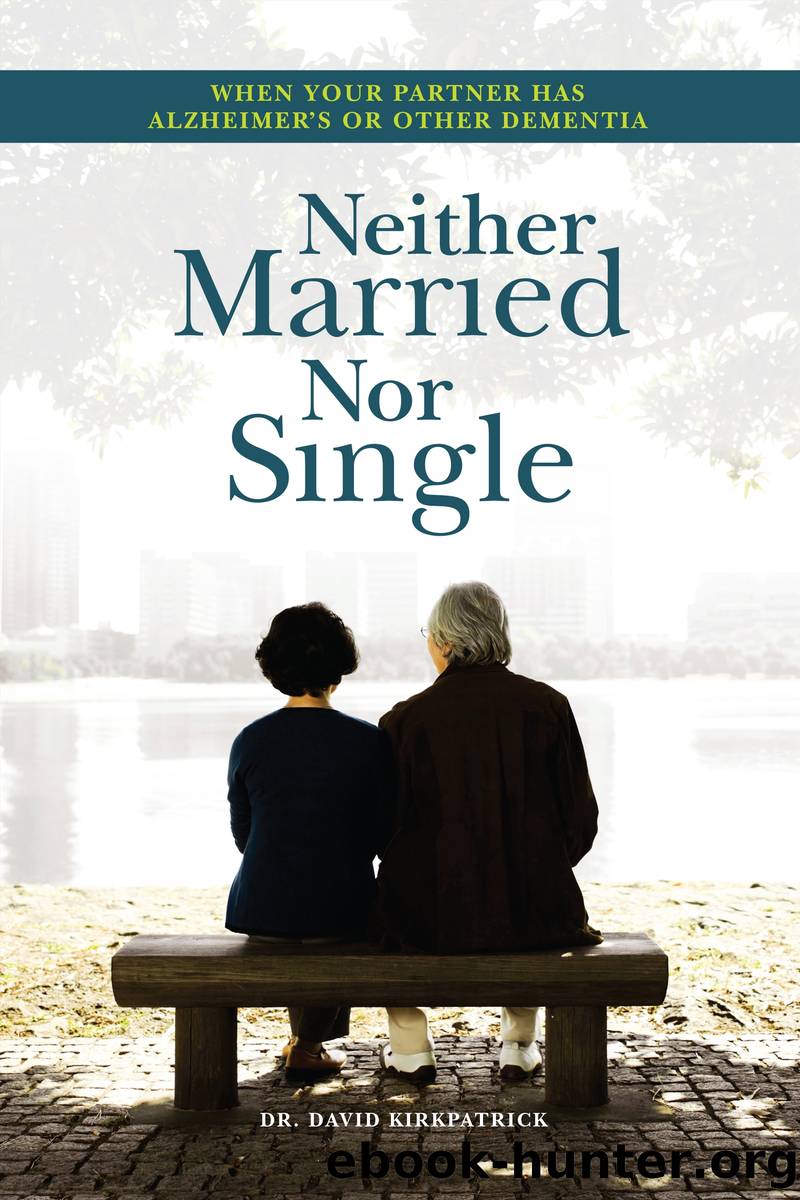Neither Married Nor Single by David Kirkpatrick

Author:David Kirkpatrick [Kirkpatrick, David]
Language: eng
Format: epub
Publisher: Brush Education
These same researchers found that the caregiverâs grief may overlap with depression. This is especially true when the caregiving role comes right on the heels of a previously complicated partnership with unresolved conflicts, mixed feelings, ambivalence, communication difficulties, emotional or physical abuse, or other important yet unresolved issues between the partners. In such cases, the challenge for the caregiving wife is especially acute and the results can be even more detrimental for the caregiver. Dr. Diana B. Denholm, the psychotherapist who wrote The Caregiving Wifeâs Handbook after overseeing her own husbandâs nightmarish trip through eleven and a half years of multiple illnesses, learned from the wives she interviewed that husbands who were abusive when they were healthy could become veritable tyrants when seriously or terminally ill.
The Alzheimer Society of Canada has prepared a detailed paper on what it terms the âambiguous lossâ that is experienced by most caregivers. This term means loving someone who is there physically, but not present in most other ways, someone who is disappearing in front of our eyes. So what does the caregiver experience in this complicated thing called ambiguous loss? One important aspect of it may be the loss of dreams and unfulfilled expectations in the shared present and the previously fantasized future. In my experience, however, one of the largest and earliest losses I experienced, which occurred soon after Clairâs diagnosis, was the disappearance of the shared, communicative partnership that I call mutuality. This is that sense that youâre on the same page as your partner nine times out of ten. Fighting. Laughing. Making up. Thereâs almost always an agreement to disagree, an understanding that youâre with each other (even when briefly youâre not with each other) physically, emotionally and psychologically.
The Alzheimer Society of Canada website also makes a useful distinction between instrumental grievers and intuitive grievers. Instrumental grievers are more comfortable âbehavingâ their grief, for example, vigorously looking after their loved ones, immersing themselves in projects and services for their living partners, then perhaps busying themselves with memorials for their lost ones. Intuitive grievers, on the other hand, feel their grief, often with a wide range of emotions including, but not limited to, sadness, frustration, anger and loneliness. Like most psychological distinctions and differences, of course, there is often an overlap between these two grieving styles within one grieving person.
Ambiguous loss also includes anticipatory grief, letting both the figurative and the actual tears fall before the final loss. With AD, this kind of loss is usually much more prolonged and much more ambiguous than with a partner facing a finite, concrete, major chronic or acute illness with better known, sharper boundaries, both in time and function. As a result, many caregivers of spouses with AD may not receive the acknowledgement or support for their grief that they expect from their families and friends because family and friends donât always realize that the caregiver is grieving. On the other hand, because most AD caregivers are aware that the closure of death may be
Download
This site does not store any files on its server. We only index and link to content provided by other sites. Please contact the content providers to delete copyright contents if any and email us, we'll remove relevant links or contents immediately.
Periodization Training for Sports by Tudor Bompa(8254)
Why We Sleep: Unlocking the Power of Sleep and Dreams by Matthew Walker(6706)
Paper Towns by Green John(5179)
The Immortal Life of Henrietta Lacks by Rebecca Skloot(4581)
The Sports Rules Book by Human Kinetics(4379)
Dynamic Alignment Through Imagery by Eric Franklin(4208)
ACSM's Complete Guide to Fitness & Health by ACSM(4057)
Kaplan MCAT Organic Chemistry Review: Created for MCAT 2015 (Kaplan Test Prep) by Kaplan(4009)
Introduction to Kinesiology by Shirl J. Hoffman(3766)
Livewired by David Eagleman(3765)
The Death of the Heart by Elizabeth Bowen(3611)
The River of Consciousness by Oliver Sacks(3599)
Alchemy and Alchemists by C. J. S. Thompson(3516)
Bad Pharma by Ben Goldacre(3422)
Descartes' Error by Antonio Damasio(3271)
The Emperor of All Maladies: A Biography of Cancer by Siddhartha Mukherjee(3155)
The Gene: An Intimate History by Siddhartha Mukherjee(3095)
The Fate of Rome: Climate, Disease, and the End of an Empire (The Princeton History of the Ancient World) by Kyle Harper(3058)
Kaplan MCAT Behavioral Sciences Review: Created for MCAT 2015 (Kaplan Test Prep) by Kaplan(2985)
